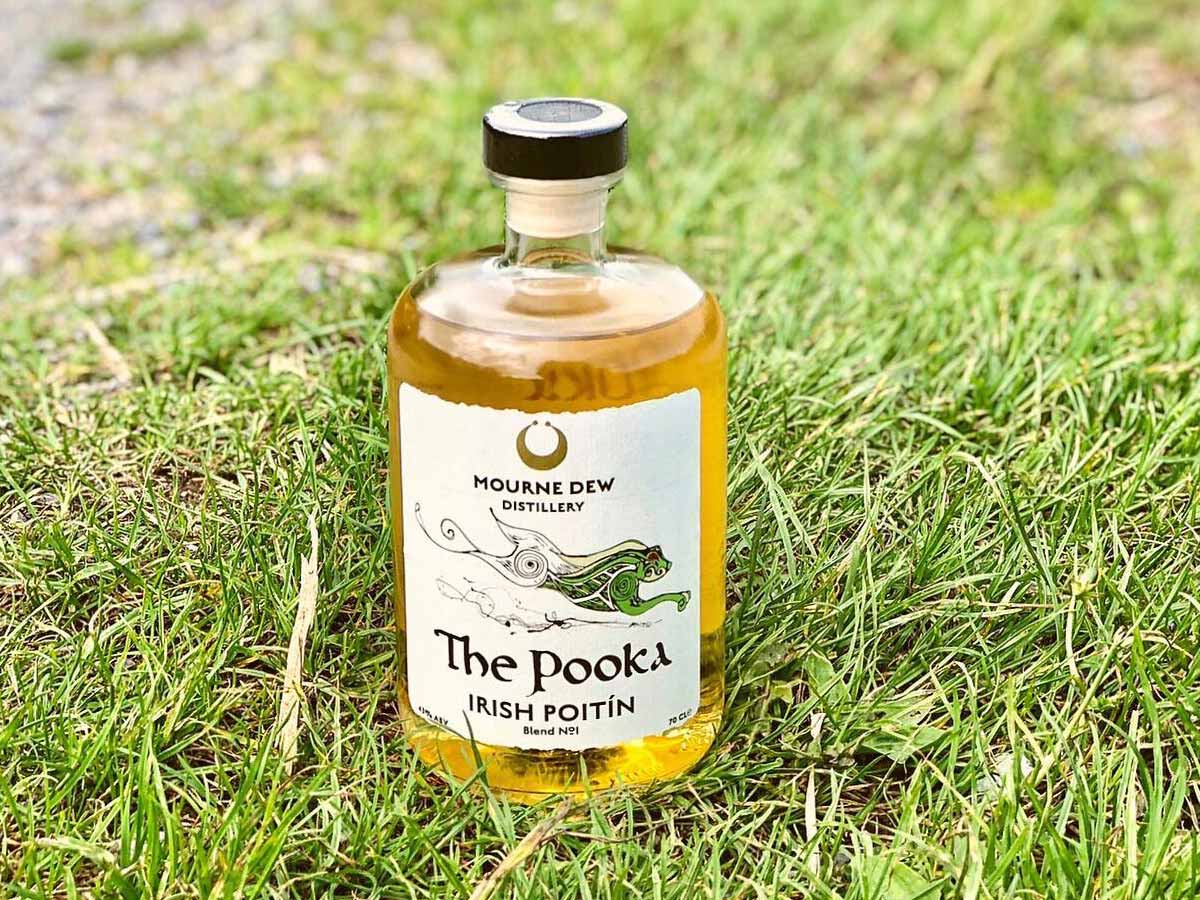

Irish poitín has a history nearly as long as the history of distilling itself. In the Red Book of Ossory; a medieval Irish manuscript, reference is made to a seventh century recipe distilled by Irish monks and made from a list of expensive and exotic ingredients that would not be out of place in a modern contemporary gin. The arts of distillation were for many years the closely guarded secrets of the monasteries, but over time the requisite know-how passed from clergy to laity and poitín became an essential part of the fabric of rural Ireland.
For centuries, practically every farm in Ireland had its own pot-still. Distillation was a means whereby farmers made sure nothing went to waste on the farm and all manner of home grown vegetation was used to produce a poitín (Irish for the ‘small pot’ in which it was made) liquor that could be enjoyed by the farmer with the waste being fed to the animals.
Such poitín was long regarded as a superior product to whiskey as the whiskey distillers cut corners to pay the taxes being levied by parliament. However, in the nineteenth century increasing levels of law enforcement saw the making of poitín driven into the wild, inaccessible places of Ireland like the Mourne Mountains, with the result that a tradition for poitín making persisted in Mourne long after it had died out in many other places on the Island. Its resulting scarcity and the difficulties arising from dodging the ‘excise men’ caused the standards of the finished products to drop. To make things worse, the very best poitins were said to be made using barley and wheat and a difficulty in sourcing these grains meant the poitín makers were forced to use other ingredients such as molasses, potatoes and milk whey. The resulting spirits just weren’t as good as the product of the grain and the reputation of poitín suffered accordingly as the years passed. Fortunately, our poitíns are made with the very best barley and wheat and as we are not being hunted by the forces of law and order we can take care to make poitíns that the master distillers of yore would have been proud of!
Despite their proximity to Belfast and Dublin the Mourne Mountains were regarded as remote and untamed throughout the eighteenth and nineteenth centuries. Villages like Rostrevor were inaccessible to travellers in those days and many crofts were hidden in mountain glens, so even in the face of adversity the art of the poitín maker was able to flourish in such places. It is this art that Mourne Dew Distillery brings to you today. Poitín is once again a legal spirit (when made by a properly licensed distillery!) and the lore that was once folk tradition has once again become commercial reality.
Mourne Dew Distillery; the first legal distillery to operate in the Mournes for many centuries, is the inheritor of this tradition of poitín making in Mourne. Our first two poitín spirits released under our ‘Pooka’ brand are an homage to the past generations who kept the blue flame of poitín burning in the wilderness. Our No1 blend is a blend of malted barley and wheat with an ABV of 43%. It is stored in wood for 10 weeks which gives it a light oaky flavour which imparts the flavours of the previously stored liquids such as bourbon, rum and oloroso. Drink it as you would a whiskey.
Our favourite cocktail is a blend of Pooka No.1, Rostrevor Ruby Gin and cranberry juice over ice. It’s our take on a Rock Lobster cocktail and IOHO that’s even better than the original version. Our sweet hazelnut variation has a less fiery ABV of 35%. Serve it neat over crushed ice or with a ginger ale. Try it in coffee or add a dash of cream for your very own hazelnut cream liqueur. Use it in baking instead of whiskey or brandy. Or just try it your own way!
[one_second]
[image src=”https://mournedew.com/wp-content/uploads/2019/06/Mourne-Dew-Distillery-Warrenpoint-Premium-Irish-Gin-The-Pooka-Irish-Poitin-No-1-Blend.jpg” size=”” width=”” height=”” align=”” stretch=”0″ border=”0″ margin_top=”” margin_bottom=”” link_image=”https://mournedew.com/wp-content/uploads/2019/06/Mourne-Dew-Distillery-Warrenpoint-Premium-Irish-Gin-The-Pooka-Irish-Poitin-No-1-Blend.jpg” link=”” target=”” hover=”” alt=”” caption=”The Pooka: No.1 Irish Blend” greyscale=”” animate=””]
[/one_second]
[one_second]
[image src=”https://mournedew.com/wp-content/uploads/2019/06/Mourne-Dew-Distillery-Warrenpoint-Premium-Irish-Gin-The-Pooka-Irish-Poitin.jpg” size=”” width=”” height=”” align=”” stretch=”0″ border=”0″ margin_top=”” margin_bottom=”” link_image=”https://mournedew.com/wp-content/uploads/2019/06/Mourne-Dew-Distillery-Warrenpoint-Premium-Irish-Gin-The-Pooka-Irish-Poitin.jpg” link=”” target=”” hover=”” alt=”” caption=”Pooka Hazelnut Poitín Liqueur” greyscale=”” animate=””]
[/one_second]
Poitín truly is the original Irish spirit; predating its whiskey relative by many centuries. From the high tables of the clergy, with drinks replete with exotic concoctions of luxurious ingredients, to the open hearth of the humblest cottiers where recipes for home made poitíns using whatever ingredients their little farms could offer were passed from father to son.
A distilling tradition has been woven into the very soul of our island identity. This tradition passed from reality to folk memory, but memory has now become reality and Mourne Dew Distillery are part of a renaissance in Irish distilling. We are a fusion of ancient and modern whereby old recipes have been updated using modern technology. Tried and tested techniques are augmented with cutting edge distillation and flavour development processes to produce outstanding prize-winning liquors.
We truly believe that our current offerings of award winning Kilbroney and Rostrevor gins and Pooka poitíns are the finest examples of their genres that you will come across. We hope you will agree!